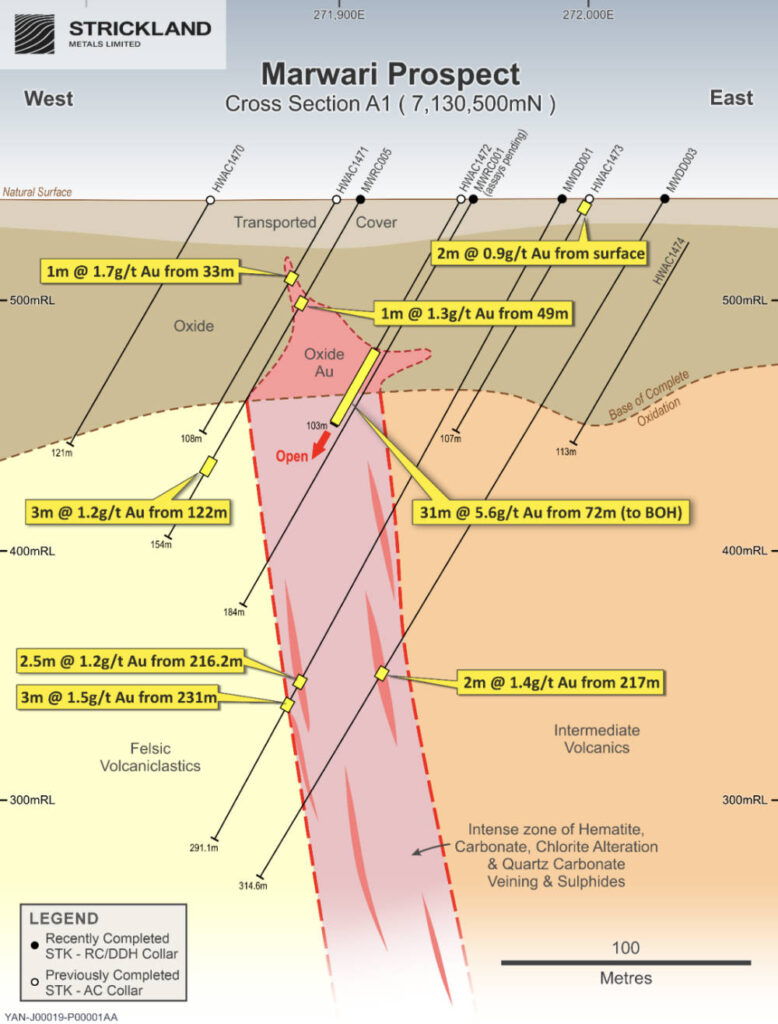Strickland Metals pinpoints a ‘large and structurally complex’ gold system at the Marwari prospect
Mining
Mining
Special Report: High-grade gold intersections have provided Strickland Metals with evidence the initial discovery hole at the Marwari prospect within its Horse Well project in WA’s prolific Yandal greenstone belt was no fluke.
Hole HWAC1472 returned a 31m intersection grading 5.6 grams per tonne (g/t) gold from a down-hole depth of 70m to the end of hole.
Cashed-up Strickland Metals (ASX:STK), which had sold its Millrose gold deposit to Northern Star Resources (ASX:NST) for $61m in July, quickly followed up its timely capital injection with step-out aircore drilling, which indicated mineralisation extends southwards for 400m.
Historical reverse circulation drilling in this area was also found to have been drilled oblique to the main Marwari structure, which remains to be systematically tested.
Assays from the first four RC holes and three diamond holes from the initial 19-hole program at Marwari have now determined the mineralisation appears to strike northeast to southwest with a southerly plunge.
Notable intersections from the RC drilling include:

However, three of the diamond holes appear to have been drilled too far east to intersect the targeted mineralised structure in fresh rock, and also with an oblique orientation.
Despite this, the diamond holes repeatedly intersected very large zones of intense alteration, which is typically seen at the outer edges of similarly large gold systems.
“While the company was hopeful of intersecting the Marwari lode again at depth in these initial diamond holes, what the holes do confirm is that we are indeed dealing with a very large and structurally complex system,” STK chief executive officer Andrew Bray said.
“This is evidenced by the extremely intense alteration, veining and complexity seen in the core, as well as the fact that the system has also been intersected over a distance of 1.1km.
“The balance of RC holes and four diamond holes remain outstanding, along with the two initial RC holes drilled at Chetak.
“Given Christmas break closures and anticipated further delays, the company expects to receive these assays in the second half of January 2024. We are eagerly awaiting additional data points from these assays to assist with refinement of the mineralisation model.”
STK has completed the first line of drilling at the Great Western gold-copper-molybdenum target with significant veining with sulphides intersected in the fresh rock in most holes.
Bray noted that these were accompanied by similarly strong geochemical anomalism to that previously observed at surface.
Over at the Rabbit Well copper-zinc-lead-silver target, the first diamond hole has confirmed the presence of a large alteration system (silica, hematite and marcasite) indicative of MVT-style mineralisation.
The company has booked a RC rig to return in the first week of January for about three weeks before operations cease in the wet season.
Planning is also underway for significant 2024 drilling programs with rigs then expected to return to site for the primary program in mid-March.
Separately, STK expects to shortly announce aircore drilling results from a prospect area to the south-west of the Marwari trend.
“A large number of aircore results from other areas also remain outstanding which, if received, will be released progressively over the next six weeks,” Bray said.
This article was developed in collaboration with Strickland Metals, a Stockhead advertiser at the time of publishing.
This article does not constitute financial product advice. You should consider obtaining independent advice before making any financial decisions.